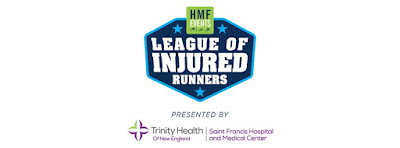 We’re
always looking for ways to provide extra perks and benefits to race
participants. With Bank of America’s
commitment to those who serve in the military, it was a natural fit to create a
race day military hospitality venue with their support. Freedom Point, presented by Bank of America,
is a pre-race and post-race space to provide a little extra TLC to all active duty military, Reserve, National Guard and
veterans and their families (military I.D. must be shown at entrance).
We’re
always looking for ways to provide extra perks and benefits to race
participants. With Bank of America’s
commitment to those who serve in the military, it was a natural fit to create a
race day military hospitality venue with their support. Freedom Point, presented by Bank of America,
is a pre-race and post-race space to provide a little extra TLC to all active duty military, Reserve, National Guard and
veterans and their families (military I.D. must be shown at entrance). This
year, two special employees will be representing Bank of America at the Eversource Hartford
Marathon
and the Charity 5K - Jason Arndt served six years in the Marine Reserves, and
Ashley Lorenz spent 11 years in active duty in the Navy, ending her service
this past winter.
This
year, two special employees will be representing Bank of America at the Eversource Hartford
Marathon
and the Charity 5K - Jason Arndt served six years in the Marine Reserves, and
Ashley Lorenz spent 11 years in active duty in the Navy, ending her service
this past winter.
Connecticut is
Ashley’s new home after being stationed overseas, she is excited to participate
on race day as a way to learn more about the community. She’s appreciated
the support of her colleagues (and is a little surprised that her dog hasn’t
been a better training partner!). She’ll
be running the 5K with ambitions to take on the Eversource Hartford Half
Marathon next year.
For
Jason, the 26.2 marathon challenge will be his first. Learn more from him below about his
experiences training – both mental and physical.
Please
join us in thanking them and those who do or have served our country.
Jason Arndt
One of the toughest parts
of this kind of feat is maintaining the long term vision and discipline - it
takes months of conditioning to get your body prepared. Having this opportunity
with Bank of America provides an additional layer of motivation and
accountability, so that I know I need to maintain focus and not slack off.
I’ve always enjoyed things
that are physically and mentally challenging. That was one of the reasons I
chose to join the Marine Corps, I felt that was going to be the biggest
challenge. When setting this kind of goal, it is extremely self-rewarding to
overcome the challenges involved and I like that kind of self accomplishment.
It probably sounds cliché,
but I really believe anything you put your mind to, you can accomplish,
especially when it comes to endurance. Every challenge you face, every goal you
set and overcome, builds mental toughness and prepares you for future
challenges. Life isn’t always easy, being able to face adversity and overcome
those challenges is a contributing factor to success. One of the things I draw
upon when training for the Eversource Hartford Marathon is previous races or
feats that I’ve accomplished - when your body wants to quit but you have to
keep pushing through. Those experiences have prepared me for this race and the
training that I’m doing.
Training has been a
challenge in and of itself. Trying to find time to go for a 2 or 3 hour run
when you have work and kids is not easy. I have been following a training
schedule, and for the first time this past weekend I felt like I was finally
getting stronger. I had to run 19 miles, and it wasn’t until about mile 16 that
I finally started to feel the aches and pains. With only a few weeks left until
the Marathon, that is certainly encouraging and hopefully puts me in position
to hit my goal of 4 hours!






